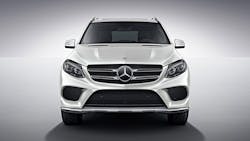Mercedes Faces Lawsuit Over BlueTec Clean Diesel Emissions
Mercedes-Benz clean diesel models were accused in a lawsuit of containing a device that causes the vehicles to violate U.S. emissions standards when run at cooler temperatures, making them less environmentally friendly than advertised.
The allegation, made in a federal lawsuit filed on February 18 in New Jersey against the German automaker, mirrors similar claims that have beset competitor Volkswagen AG. It was brought by a Mercedes owner in Illinois, who claims the automaker uses the device in its BlueTec cars to turn off a system meant to reduce nitrogen oxide in its exhaust.
Joerg Howe, a spokesman for Mercedes’s parent Daimler AG, called the claim “baseless” and said the company would review the complaint and defend itself. The suit, filed by Hagens Berman Sobol Shapiro LLP, a law firm that has been active in pursuing consumer cases against Volkswagen, couldn’t immediately be located in court records.
“All our vehicles comply with regulatory frameworks,” Howe said. “All our vehicles are certified according to the laws.”
Daimler fell as much as 4.2%, the biggest intraday decline since Feb. 4, and was down 1.1% to 63.58 euros at 10:48 a.m. in Frankfurt. The shares have dropped 18% so far this year, compared to a 12% dip for the benchmark DAX Index.
Diesel Scandal
The claim comes five months after Volkswagen admitted it installed software in its diesel vehicles to cheat emissions testing, in a scandal that has rippled through the global car industry. While carmakers generally acknowledge that tests conducted in labs and real-world emissions don’t necessarily produce the same results, other manufacturers have denied that they also cheated. Still, the scandal has tarnished the image of diesel engines, touted by manufacturers as a cleaner technology that is less harmful to the environment.
Automakers remain under increased scrutiny. Last month Renault SA shares plummeted after news of raids by French investigators as part of a probe into vehicle emissions. Renault recovered much of its lost market value after France’s Environment Minister Segolene Royal said no fraudulent systems had have been discovered and that shareholders and employees should “rest easy.”
For Daimler, the device in Mercedes’s diesel models turns off pollution controls at temperatures below 50 degrees Fahrenheit (10 Celsius), allowing the autos to violate emissions standards, according to the complaint.
Seattle-based Hagens Berman said it based its allegation in part on an article appearing in this month’s edition of the German magazine Der Spiegel. The magazine reported that Mercedes admitted the shut-off is done to protect the engine, according to the complaint.
Dutch Test
The firm also cites a study conducted by independent testing agency TNO for the Dutch Ministry of Infrastructure and the Environment, which said that in real-world testing, the Mercedes C-Class 220 emits more nitrogen oxide than measured in laboratory results.
“Mercedes never disclosed to consumers that Mercedes diesels with BlueTEC engines may be ‘clean’ diesels when it is warm, but are ‘dirty’ diesels when it is not,” according to the complaint. “Mercedes never disclosed that, when the temperature drops below 50 degrees, it prioritizes engine power and profits over people.”
While it’s typical for real-world results to differ from lab tests, Monique de Geus, a spokeswoman for TNO, said the firm’s tests showed that many models sold in Europe had emissions that were much higher than allowed. Mercedes’s BlueTec models were among those tested, she said.
“It’s normal that emissions can be higher but not in the range they are now,” de Geus said, without referring to specific models. “They are a lot higher.”
Even if Mercedes is able to make the cars compliant with emissions standards, those who drive them will suffer harm because the vehicles won’t perform as promised or advertised, Hagens Berman said in the complaint. The suit is seeking a court order compelling Mercedes to recall the affected models or replace them for free, in addition to unspecified damages.
The law firm is proposing to represent a nationwide class that includes all U.S.-based residents and entities that bought or leased an affected vehicle as of this month. Among the enumerated models are Mercedes’s ML320 and 350 sport utility vehicles, its E- and S-Class cars, and GLE crossovers.
The lawsuit is Lynevych v. Mercedes-Benz USA, U.S. District Court, District of New Jersey.
About the Author
Bloomberg
Licensed content from Bloomberg, copyright 2016.
